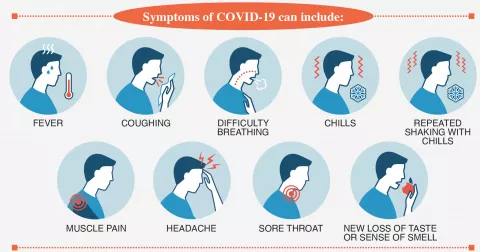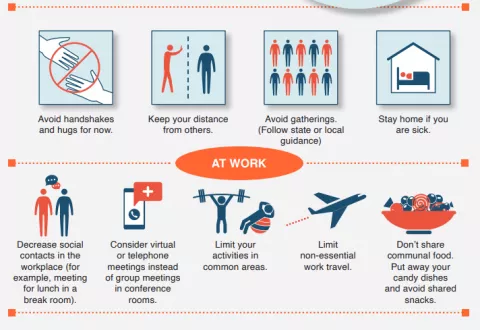What Should I Do If I Think I'm Sick?

May 5, 2020
If you are starting to feel ill these days you are probably wondering if you have COVID-19. Symptoms of COVID-19 include fever, cough and shortness of breath. Symptoms may also include chills, repeated shaking with chills, muscle pain, headache, sore throat and new loss of taste or sense of smell. These symptoms may appear two to 14 days after exposure to the virus. This list is not all-inclusive. Please consult your medical provider about any other symptoms that are severe or concerning to you.
Because confusion and miscommunication are common in situations like this, Dr. Matt Bartels, vice president and chief medical officer for BlueCross BlueShield of South Carolina, answers some of the more common questions for members who think they may have COVID-19. You can be confident that health care professionals around the world — and right here in South Carolina — are working to ensure everyone who needs care gets it.
I am not feeling well. What do I do now?
Call your doctor: If you think you have been exposed to COVID-19 and develop a fever and symptoms, such as cough or difficulty breathing, call your health care provider for medical advice.
If you have had close contact with someone with COVID-19 or you are a resident in a community where there is ongoing spread of COVID-19 and develop symptoms of COVID-19, call your health care provider. Tell them your symptoms and your exposure. They will decide whether you need to be tested, but keep in mind that there is no treatment for COVID-19. People who are mildly ill may be able to isolate and care for themselves at home.
If you are unsure, you can talk to a doctor using Blue CareOnDemandSM. It is important to note that virtual care lines are currently experiencing longer wait times than usual. If you can, try calling during non-peak hours (mid-day).
Where can I get tested for COVID-19?
Not everyone will need to be tested for COVID-19. We encourage anyone who is suffering from likely COVID-19 symptoms to call their doctor to receive appropriate instructions. If you do not have a doctor, contact your nearest hospital system’s website. Most of them are offering online triage.
How much will I have to pay for the COVID-19 test?
The test for COVID-19 is free to the majority of our members (please confirm with your HR personnel), including those in a high-deductible health plan. There may be additional charges for the office visit or other tests to rule out other diagnosis, such as flu or other respiratory conditions.

What is the COVID-19 test? What should I expect?
Patients have a swab – think of it as a long Q-tip – inserted through their nose to collect cells from the nasopharyngeal region.
Once the sample is taken, it is put into a sterile container and sent to a lab, where a chemical is used to pull the cells off the swab and turn the sample into a liquid form. That liquid is then put into a machine that goes through hot and cold cycles to make multiple copies of the virus’ ribonucleic acid (RNA), which carries genetic information. The machine looks to match the coronavirus RNA to determine a positive or negative result.
The availability of test results can vary from 48 hours to a four or five day wait.
Your testing site will tell you approximately how long it will take and how you will get the results of your test.
What happens if I am diagnosed with COVID-19?
There is currently no FDA approved treatment for COVID-19. However, your doctor will recommend ways to manage your symptoms.
Some people may be hospitalized, especially if they are having respiratory issues.
For those that have manageable symptoms, we recommend staying at home. Here are some tips:
- Monitor the patient’s symptoms. If the patient is getting sicker, call his or her health care provider and tell them that the patient has laboratory-confirmed COVID-19.
- Household members should stay in another room or be separated from the patient as much as possible — think of it as a designated “sick room.” Household members should use a separate bedroom and bathroom, if available.
- Prohibit visitors who do not have an essential need to be in the home.
For more tips, visit the CDC website.
How can I prevent getting or spreading COVID-19?
The best ways to stop the spread of COVID-19 is to practice good hygiene and social distancing. Wash your hands frequently with soap and water for at least 20 seconds. You should do this especially after being in a public place, or after blowing your nose, coughing, or sneezing.
If soap and water are not readily available, use a hand sanitizer that contains at least 60% alcohol. Cover all surfaces of your hands and rub them together until they feel dry.
Avoid touching your eyes, nose and mouth with unwashed hands.
Avoid close contact with other people, especially those who are sick.
Put distance between yourself and other people if COVID-19 is spreading in your community. This is especially important for people who at higher risk of getting very sick.
Who is at higher risk of getting sick?
Because this is a new, or novel, virus virtually everyone is at risk for getting infected. The current data shows that individuals over 65 and anyone with underlying health conditions are at greater risk of severe illness. However, people of all ages have been diagnosed with COVID-19. Even people in their 20s, 30s and 40s have had serious symptoms from the disease.
In South Carolina, the age range for COVID-19 has been 2 months to 93 years old according to data from the South Carolina Department of Health and Environmental Control.
Everyone should follow guidelines from the CDC to prevent the spread of COVID-19.